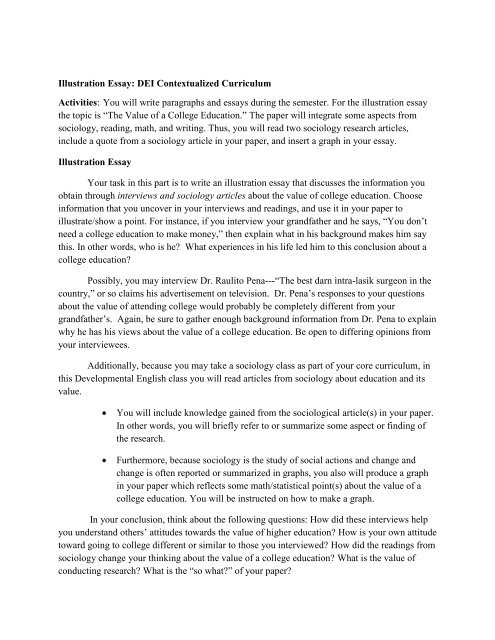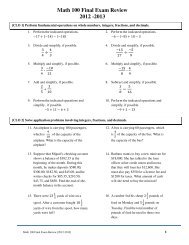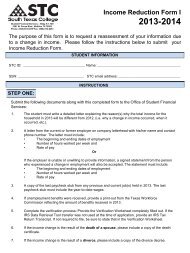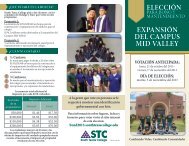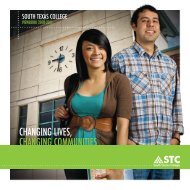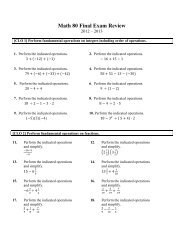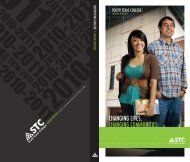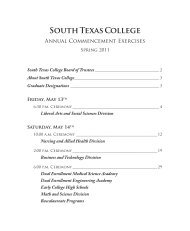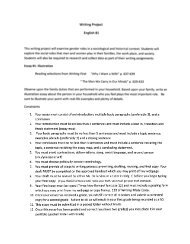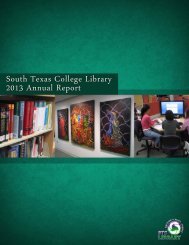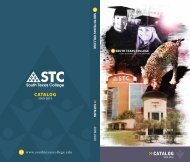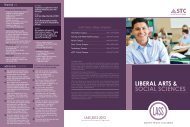Illustration Essay - Developmental Studies
Illustration Essay - Developmental Studies
Illustration Essay - Developmental Studies
Create successful ePaper yourself
Turn your PDF publications into a flip-book with our unique Google optimized e-Paper software.
<strong>Illustration</strong> <strong>Essay</strong>: DEI Contextualized CurriculumActivities: You will write paragraphs and essays during the semester. For the illustration essaythe topic is “The Value of a College Education.” The paper will integrate some aspects fromsociology, reading, math, and writing. Thus, you will read two sociology research articles,include a quote from a sociology article in your paper, and insert a graph in your essay.<strong>Illustration</strong> <strong>Essay</strong>Your task in this part is to write an illustration essay that discusses the information youobtain through interviews and sociology articles about the value of college education. Chooseinformation that you uncover in your interviews and readings, and use it in your paper toillustrate/show a point. For instance, if you interview your grandfather and he says, “You don’tneed a college education to make money,” then explain what in his background makes him saythis. In other words, who is he? What experiences in his life led him to this conclusion about acollege education?Possibly, you may interview Dr. Raulito Pena---“The best darn intra-lasik surgeon in thecountry,” or so claims his advertisement on television. Dr. Pena’s responses to your questionsabout the value of attending college would probably be completely different from yourgrandfather’s. Again, be sure to gather enough background information from Dr. Pena to explainwhy he has his views about the value of a college education. Be open to differing opinions fromyour interviewees.Additionally, because you may take a sociology class as part of your core curriculum, inthis <strong>Developmental</strong> English class you will read articles from sociology about education and itsvalue.You will include knowledge gained from the sociological article(s) in your paper.In other words, you will briefly refer to or summarize some aspect or finding ofthe research.Furthermore, because sociology is the study of social actions and change andchange is often reported or summarized in graphs, you also will produce a graphin your paper which reflects some math/statistical point(s) about the value of acollege education. You will be instructed on how to make a graph.In your conclusion, think about the following questions: How did these interviews helpyou understand others’ attitudes towards the value of higher education? How is your own attitudetoward going to college different or similar to those you interviewed? How did the readings fromsociology change your thinking about the value of a college education? What is the value ofconducting research? What is the “so what?” of your paper?
Constraints:1. Via small-group, you will practice interviewing.2. For the oral questions, you must interview at least three people: one person who hasnever attended college, one person who may have started college but never or has not yetfinished, and one person who has finished college (two or four year college/university).Also, each interviewee will fill out a short multiple choice survey.3. Take careful notes when interviewing. Follow the rules you have learned aboutconducting a good interview. Introduce yourself and explain why you are conducting theinterview about education. Tell the interviewees that you will not use their names in yourpaper if they do not want their names to be revealed (privacy). Attach the interview notesto your final essay.4. Include at least one reference in your paper to the sociology articles (e.g., According toMark Hugo Lopez (2009), “Nearly nine-in-ten (89%) Latino young adults ages 16-25 saythat a college education is important…”).5. Include a graph within your written text. Write a linking sentence in your text before thegraph and include a caption below the graph.6. Write a five or six paragraph illustration essay about people’s opinions on the value of acollege education. Use examples and quotes as well as your own ideas and attitudes abouta college education. You will have an introduction, three to four body paragraphs, aconclusion, a graph, and a sociology reference in your paper.
<strong>Illustration</strong>: Interview QuestionsInterviewer’s Name (student’s name) _____________________________Interviewee Name: _____________________________Male ______________ Female ______________Interviewee’s occupation ________________________________Introduce yourself and ask the interviewee if you can ask him/her some questions about education(e.g., “I am writing a paper for my English 071 class at STC about education, and I wouldgreatly value your opinions. May I ask you a few questions for my paper? If desired, I willnot use your name in my paper.”) Interview at least three people: one person who has neverattended college, one person who may have started college but never or has not yet finished, andone person who has finished college (two or four year college/university).ORAL QUESTIONS1. Tell me about yourself. (What is your name/where do you live now? Where were you born?Where is your family from?)______________________________________________________________________________________________________________________________________________________2. Did your parents/grandparents go to school? _______________________________________3. Up to what grade and why?______________________________________________________________________________________________________________________________________________________4. Did you go to school? _________________________________________________________5. Why/why not?______________________________________________________________________________________________________________________________________________________6. Up to what grade/level? Why? ________________________________________________________________________________________________________________________________________________________________________________________________________7. Did your parents feel it was important for you to finish high school or not?______________________________________________________________________________________________________________________________________________________8. What education/career expectations did your family have for you?______________________________________________________________________________________________________________________________________________________9. What did your parents want you to be? Or, did they ever express their opinions about that?Why or why not?______________________________________________________________________________________________________________________________________________________10. When you were younger, did you have dreams or aspirations regarding a career? (Why orwhy not? If you had dreams about a career, what were they?)______________________________________________________________________________________________________________________________________________________
11. Were these career aspirations in conflict with what your parents wanted for you?______________________________________________________________________________________________________________________________________________________12. What dreams do/did you have about income? (e.g., What do/did you used to think you couldmake ($$$), and what is/was the reality?)______________________________________________________________________________________________________________________________________________________13. Do you feel income is related to level of education? Why or why not?______________________________________________________________________________________________________________________________________________________14. What obstacles did you face in obtaining an education? Why?______________________________________________________________________________________________________________________________________________________15. Were you ever denied an education? Explain (denied can mean others were offeredsomething/encouraged about something in education, but you were not.)______________________________________________________________________________________________________________________________________________________16. Do you think a college education makes a difference in a person’s self-esteem? If so, in whatways? If not, why not?______________________________________________________________________________________________________________________________________________________17. What advice would you give to a younger person about the best way to obtain an education?(There are many ways to be educated, and all may not involve going to college.)______________________________________________________________________________________________________________________________________________________18. Is it necessary for people---no matter their age---to have educational goals? Why or why not?______________________________________________________________________________________________________________________________________________________19. What do you consider to be valuable about a college education?______________________________________________________________________________________________________________________________________________________20. With regards to education—who are you? Explain______________________________________________________________________________________________________________________________________________________(Do not forget to ask each interviewee to fill out the SURVEY)
SurveyCheck one: Male_______ Female_______1. On a completion scale of one to seven with one the lowest and seven the highest, where do yourank your completion of educational goals? (i.e., “Have I gotten what I want out of myeducation?”) Please circle your answer.1 2 3 4 5 6 72. On a value scale of one to seven with one the lowest and seven the highest, where do you rankhow you value a college education? Please circle your answer.1 2 3 4 5 6 73. How much more money per year will an STC college graduate (2-year degree) earn compared tosomeone with only a high school diploma? Please check off one response.1.____ $5,000-$24,000 more per year2.____ $26,000-$49,000 more per year3.____ $50,000-$79,000 more per year4.____ $80,000-$100,000 more per year5.____ $100,000 + more per year4. How much more money per year will a college/university graduate (4-year degree) earncompared to someone with a 2-year STC degree? Please check off one response.1.____ $5,000-$24,000 more per year2.____ $26,000-$49,000 more per year3.____ $50,000-$79,000 more per year4.____ $80,000-$100,000 more per year5.____ $100,000 + more per year5. On average, how much do you think the Rio Grande Valley elementary and high schools spendon each student per year? Please check off one response.1. _____ $500 - $1,5002. _____ $1,600 - $2,6003. _____ $2,700 - $3,7004. _____ $3,800 - $4,8005. _____ $4,900 - $5,9006. _____ more than $6,000Thank you so much for your time and responses. Your input is greatly appreciated!


